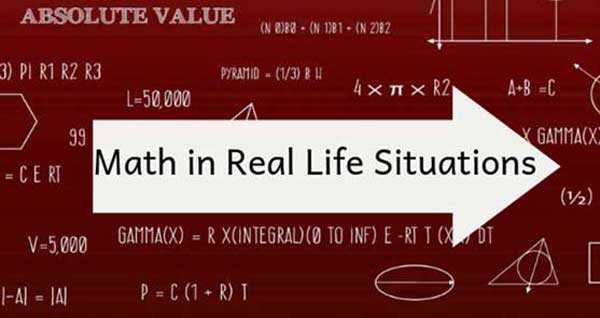Whether we are aware of it or not, we use math in everyday applications. In fact, when one observes carefully, one could find math manifest in most unlikely places. From puzzle games both simple and complex to the musical notes to creating or building masterpieces and monuments to basic calculations to effective time management it is math and math everywhere. Thus, one could declare mathematics to be the universal language where we use math every day either consciously or without on a conscious or a subconscious level.
Have you ever wondered as to how, if, and when would one use math in the real world or real life situations? The answer to this wonderment would be that one uses math in real life situations almost all the times. This being said unless one’s an engineer or one applying actuarial science, one may not use abstract mathematics. However, we often develop certain underlying skills of byproducts of learning mathematics in schools and colleges that we often make use of to solve real-world problems.
Build it accurately and building it right with mathematics
Construction and architecture that involves building a definite structure are one of the areas closely integrated with math that gives us the best examples of mathematics personified. Determining the right raw materials and the exact proportion or composition is nothing but the application of a broad range of mathematics. Right from calculating the amount of cement and sand for laying down a said number of bricks to measuring the length, breadth, and angles to estimating the cost of the raw materials, labor, etc. is pure mathematics.
It is one of the examples of mathematics deeply integrated with engineering or rather the science of architecture. Math is thus one of the most important fundamentals of quality education. Some of the innovative schools like Jain International Residential School incorporate small learning projects that entail building simple structures and models that will urge the students to apply their math-related skills like measuring, estimating while building projects using definite angles and calculations.
Mathematics deeply rooted in financial literacy
People who manage their finances poorly and the ones who make great financial mistakes are the ones who tend to spend their finances or invest it solely based on their emotions. It means that having strong mathematical skills is crucial to make the right financial decisions. For instance; understanding the concepts like exponential growth, compound interest, calculating EMI, etc. are closely integrated with math. Thus, one can say that mathematics definitely aids one in managing their finances better. When you apply specific concepts of math with real-life financial instances like budgeting and investments you will manage your finances wisely.
Introducing children to financial literacy is crucial as they learn new concepts in math. By encouraging them to spend and save based on pure mathematics rather than emotions will have a positive impact on their lives in the long run. One must also realize that financial literacy is a skill that one must embrace as early as in school or college which makes adapting it easy while transcending into the mainstream.
Time Management and Mathematics
Time is one of the most valuable assets and even so more than one’s finances. It is not just important to tell time or understand the time zones or the calendars, what matters most is to value time. It is very easy to pass time without accomplishing much but this is a trait one must get rid off to stay on par with the fast-paced modern world. Time is also important to set goals and to reach one’s objective. And mathematics comes into play in effective time management rather indirectly. In fact, math helps us to stay organized.
Math is everywhere, and if you search deep you can find it reflect in the mundane where it is applied for better accurate results and enhanced productivity. As there is no age limit for learning in general, there is no age limit to learning math. Treat mathematics as more than an academic subject that reflects on your progress card. Treat math as the way of life for its math and math everywhere.


